

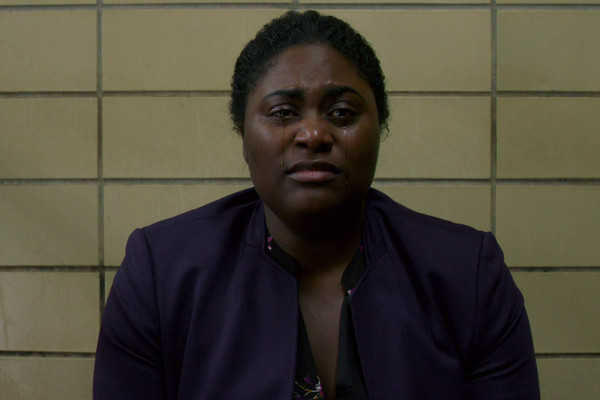
The first five seasons of the programme are available via Amazon. In the meantime, please join me in looking back over season six, and ranking the 13 episodes from worst to best...
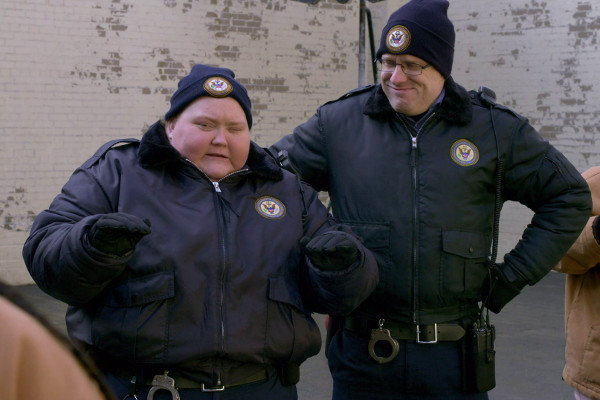
An episode directed by Laura Prepon (Alex), it contains, unfortunately, some of the more unbelievable events that also dogged season five. While to nowhere near the same ludicrous heights, one of the subplots of the season is a betting game among the guards to earn points based on mishaps befalling the inmates. While it has a sense of believabiliity about it as a core idea, the execution is pushed too far towards light relief, rather than the "dark turn" of the episode's title.
One of the weaker elements of the series, particularly this late into its run, is that its fixations with the psychology behind the Stanford prison experiment frequently involve sadistic guards being depicted as either one-dimensional, or overtly comedic, or, worse, both. Having two guards dispassionately discussing a prisoner's fate while she may be lying dead could work, but it's cooked up for easy laughs.
Orange is the New Black is, of course, a comedy drama, but it must still be believable in order for said comedy to work. Prepon helmed one of the more tense season five episodes, but she's given no chance here, with a script that lets some of the tension of the season escape. There's no bad episode in season six, a season which gets the series back on track, but this is its weakest entry.
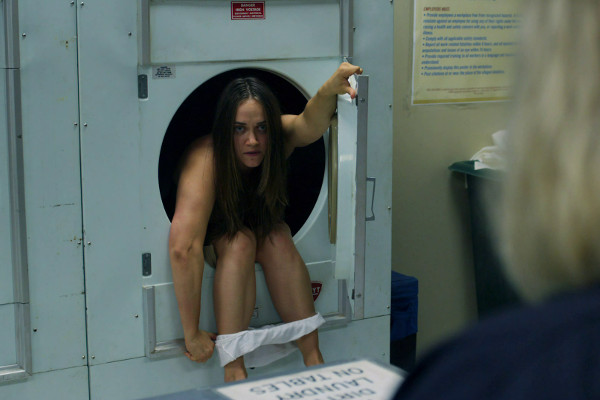
The occasionally juvenile underbelly of Orange is the New Black once more raises its (turtle) head as the centrepiece of this episode involves inmates defecating in washing machines. As one of the inmates likes to go naked whenever using the toilet we also get some of the somewhat exploitative nudity that the programme sometimes delves into. There's also a doctor there to do vaginal examinations, which, while causing characters to reflect on their ageing, is also packaged in a somewhat crass manner.
New writer Merritt Tierce manages to mix in some more serious plot issues among the trivial fluff about Flacca and Black Cindy auditioning to be DJs, and the strong plot backbone is what keeps season six moving forward even in its weaker moments. Sophia makes another appearance, a fan favourite character that the writers never seem to know what to do with, and the entire episode ends with the Jay Hayden song "Talk About Shit". It's appropriate on more than one level, even though any stylish sense of ironic juxtaposition is, for once, absent from the end credits track.
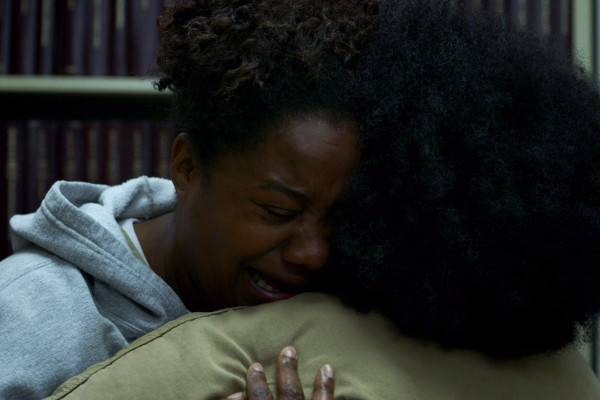
Kirsa Rein was a writer's office PA since season two, finally becoming a script coordinator with season four. Break The String is her first credit as an episode writer, an instalment that sees new allegiances made. Nichols gets on good terms with the murderous sister running her block, while Piper reconciles with Maria and, in one of the series' more unlikely developments, Luschek gets close to Gloria.
The budget for Orange is the New Black averages around four million an episode, but despite this, there's some shockingly bad green screen work on windows during a "car journey" with Aleida and Hopper, the guard she'll later use as an unwitting drug mule. It's not the only time this season that obviously fake "car journies" take place, with most of the road trip with Coates and Pennsatucky also difficult to sit through. A decent instalment ends with the joy of The Tokens' "The Lion Sleeps Tonight".
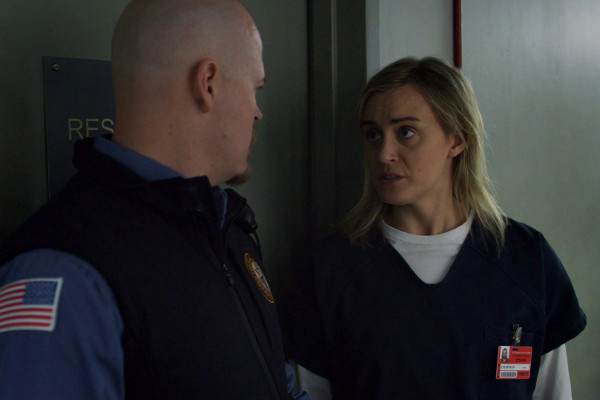
Whereas many Orange is the New Black seasons begin with lighter episodes and gradually build tension, season six somewhat lets the escalating tensions evaporate with episodes 11 and 12. That's not to say that there's not developments happening, with a growing gang war and Taystee's trial, but it often acts as a backdrop to events which blur the line between comedy and just plain silliness.
Part of the biggest problem with the programme is that its ostensible lead character and headlining actress is no longer the central role. While Piper is quite liked here at The Anorak Zone - even if she is something of a dick - she's far from the most popular character among the series' fanbase, and this even appears to be reflected on screen. Whereas earlier seasons had seen her face the trauma of being branded or threatened, season six has even Alex laugh when she breaks a tooth after being assaulted.
The logical extension of Piper's character arc is that she'll try to stay out of trouble, leaving the violence to the hardened inmates... but by doing so, she's become a guest character in her own series, a preppy comic relief intent on organising sports days while the plots move largely without her. This is not an express criticism as the series explores more interesting characters and issues without her, but is a curiosity in its almost unique set-up.
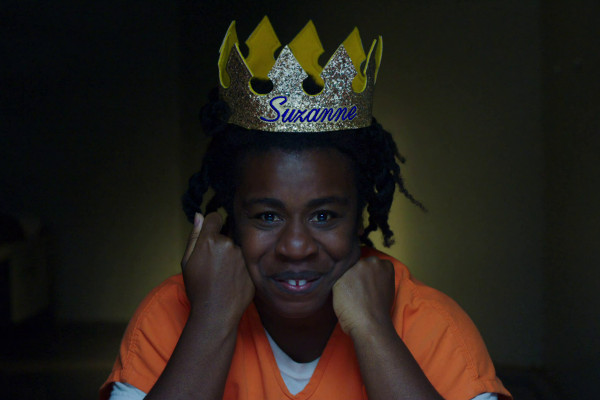
Season six begins with Suzanne off her medication and having hallucinations which the audience are invited to experience with her... seeing Red as a clown and Nicki as Rowlf from The Muppets is more surreal than the show normally goes for, but just about works.
The sixth season gets things back on track after an astonishingly weak fifth by taking a select few Litchfield inmates and planting them in a max security system with all-new fellow inmates. It ultimately lacks the drama and tension that such a situation would warrant, so isn't quite the shot in the arm the programme needs, but it keeps things moving along nicely and restores the programme back to its bingeable self, if not quite its best.
Part of the real issue is that the series is now so familiar... while "Crazy Eyes" was once a great and surprising character, familiarity renders the character largely incapable of surprise, despite Uzo Aduba's best efforts. It's not just Suzanne that is affected by this sense of a series reaching the end of its natural lifespan; as the characters are stationary due to the nature of the programme, both literally and figuratively, there's very little chance for any of them to grow. This is not an express criticism, more just a natural state of series entropy.
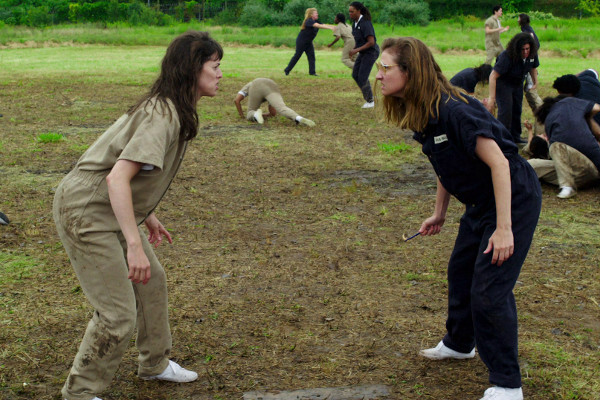
"What do you want, Barbie? I mean, besides an ass that don't look like a pizza box" isn't the finest hour for dialogue in OITNB, and it's not the only stinker here, but for a season that got off the ground running, then the plot fits together well. Ashley Bacon makes her first of three appearances as the 1980s version of Frieda, and while she appears to be too young for the role (it's never made quite clear what the timeline is, but if Frieda is the same age as actress Dale Soules, then the character would have been forty in 1986) it works well.